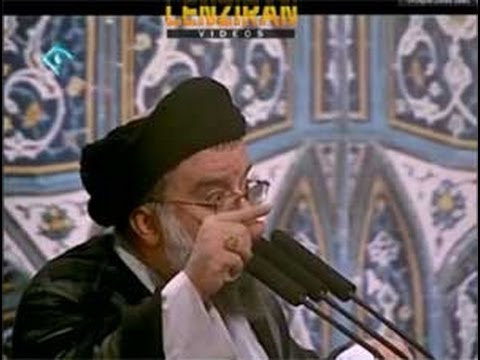LATEST: Leading University to Restore Humanities Programs
The campaign within Iran’s regime against “sedition” — the mass protests against the disputed 2009 Presidential election — continued on Friday, with the Tehran Prayer Leader, Ayatollah Ahmad Khatami, leading through comparison.
Khatami, a prominent hard-liner, said the demonstrations — notably, protests in December 2009 that pushed back security forces in Tehran — were worse than the frontline of the 1980s Iran-Iraq War:
In recent weeks, some politicians, military commanders, and clerics have escalated the condemnation of the 2009 protests as a foreign-backed plot for regime change. The apparent aim is to box in the Rouhani Government, preventing it from taking steps to free political prisoners — including opposition leaders Mir Hossein Mousavi and Mehdi Karroui — and ease censorship and pressure on activists.
See Iran Daily: Boxing in Rouhani with Campaign Against “Sedition”
The head of State broadcaster IRIB, Ezzatollah Zarghami, said on Wednesday:
Those arrested in the 2009 events are not political prisoners, and because they intended to overthrow the regime, they are considered security prisoners….
The regime must seriously confront the ‘Heads of Sedition’”—sedition is a term used by government officials to refer to the 2009 protests—”and to stop tolerating them.
The head of the Guardian Council, Ahmad Jannati, added, “The imprisoned seditionists have committed crimes thousands of times bigger than those of armed robbers and rapists…. No rational human being would accept that there was fraud in the election.”
Speaking about Syria on Friday, Khatami called on Sunnis and Shia to unite against the insurgency:
Prominent Sunni clerics, who are highly disappointed with the conduct of the murderer Takfiris are advised to join Shiite clergies in announcing that those criminals’ deeds are fully unrelated to Islam.
The Shiite and Sunni clerics will save Islam’s prestige if they do so.
Leading University to Restore Humanities Programs
Allameh Tabatabai University is restoring humanities programs, more than two years after they were removed.
The Head of Social Sciences at the University said students will be accepted for programs starting in September.
Programs such as philosophy, business administration, psychology, and journalism were dropped in 2011, amid pressure from the regime.
The Supreme Leader had said that universities and specifically the humanities were the breeding ground of anti-Islamic thought and dissent, such as that following the disputed 2009 Presidential election.
The hardline President of Allameh Tabatabai was removed earlier this year, after the election of President Rouhani.

